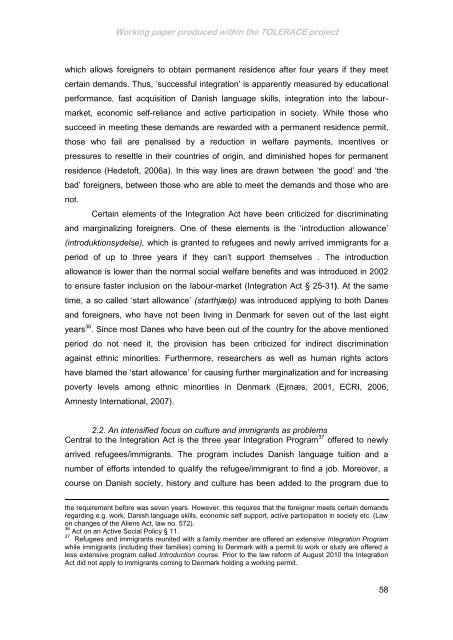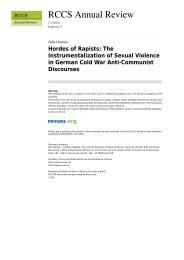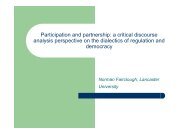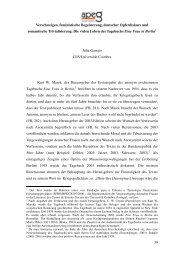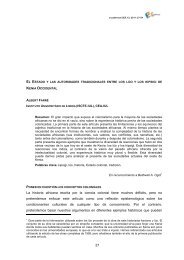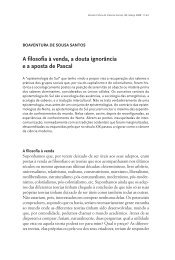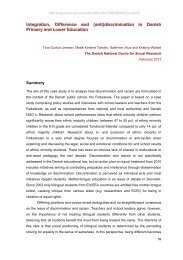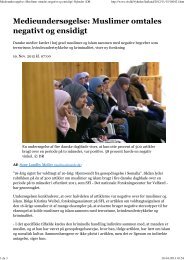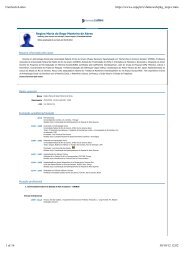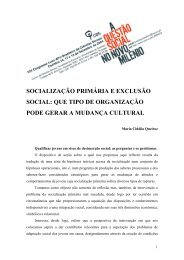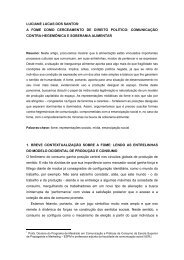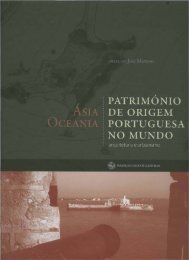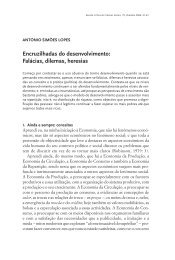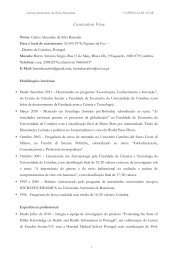Analysis of Integration Policies and Public State-Endorsed ...
Analysis of Integration Policies and Public State-Endorsed ...
Analysis of Integration Policies and Public State-Endorsed ...
Create successful ePaper yourself
Turn your PDF publications into a flip-book with our unique Google optimized e-Paper software.
Working paper produced within the TOLERACE project<br />
which allows foreigners to obtain permanent residence after four years if they meet<br />
certain dem<strong>and</strong>s. Thus, ‗successful integration‘ is apparently measured by educational<br />
performance, fast acquisition <strong>of</strong> Danish language skills, integration into the labour-<br />
market, economic self-reliance <strong>and</strong> active participation in society. While those who<br />
succeed in meeting these dem<strong>and</strong>s are rewarded with a permanent residence permit,<br />
those who fail are penalised by a reduction in welfare payments, incentives or<br />
pressures to resettle in their countries <strong>of</strong> origin, <strong>and</strong> diminished hopes for permanent<br />
residence (Hedet<strong>of</strong>t, 2006a). In this way lines are drawn between ‗the good‘ <strong>and</strong> ‗the<br />
bad‘ foreigners, between those who are able to meet the dem<strong>and</strong>s <strong>and</strong> those who are<br />
not.<br />
Certain elements <strong>of</strong> the <strong>Integration</strong> Act have been criticized for discriminating<br />
<strong>and</strong> marginalizing foreigners. One <strong>of</strong> these elements is the ‗introduction allowance‘<br />
(introduktionsydelse), which is granted to refugees <strong>and</strong> newly arrived immigrants for a<br />
period <strong>of</strong> up to three years if they can‘t support themselves . The introduction<br />
allowance is lower than the normal social welfare benefits <strong>and</strong> was introduced in 2002<br />
to ensure faster inclusion on the labour-market (<strong>Integration</strong> Act § 25-31). At the same<br />
time, a so called ‗start allowance‘ (starthjælp) was introduced applying to both Danes<br />
<strong>and</strong> foreigners, who have not been living in Denmark for seven out <strong>of</strong> the last eight<br />
years 36 . Since most Danes who have been out <strong>of</strong> the country for the above mentioned<br />
period do not need it, the provision has been criticized for indirect discrimination<br />
against ethnic minorities. Furthermore, researchers as well as human rights actors<br />
have blamed the ‗start allowance‘ for causing further marginalization <strong>and</strong> for increasing<br />
poverty levels among ethnic minorities in Denmark (Ejrnæs, 2001, ECRI, 2006,<br />
Amnesty International, 2007).<br />
2.2. An intensified focus on culture <strong>and</strong> immigrants as problems<br />
Central to the <strong>Integration</strong> Act is the three year <strong>Integration</strong> Program 37 <strong>of</strong>fered to newly<br />
arrived refugees/immigrants. The program includes Danish language tuition <strong>and</strong> a<br />
number <strong>of</strong> efforts intended to qualify the refugee/immigrant to find a job. Moreover, a<br />
course on Danish society, history <strong>and</strong> culture has been added to the program due to<br />
the requirement before was seven years. However, this requires that the foreigner meets certain dem<strong>and</strong>s<br />
regarding e.g. work, Danish language skills, economic self support, active participation in society etc. (Law<br />
on changes <strong>of</strong> the Aliens Act, law no. 572).<br />
36 Act on an Active Social Policy § 11.<br />
37 Refugees <strong>and</strong> immigrants reunited with a family member are <strong>of</strong>fered an extensive <strong>Integration</strong> Program<br />
while immigrants (including their families) coming to Denmark with a permit to work or study are <strong>of</strong>fered a<br />
less extensive program called Introduction course. Prior to the law reform <strong>of</strong> August 2010 the <strong>Integration</strong><br />
Act did not apply to immigrants coming to Denmark holding a working permit.<br />
58


